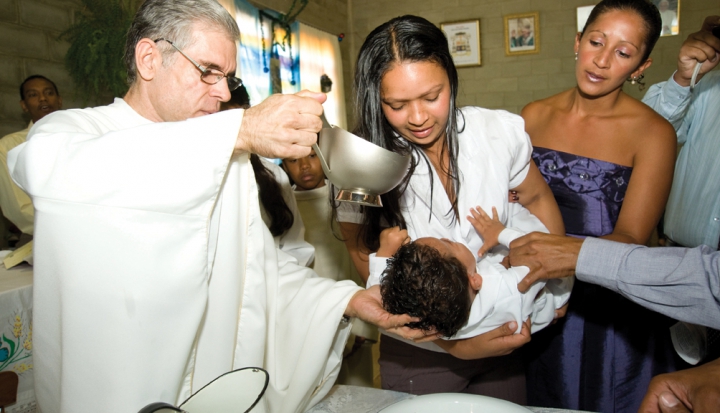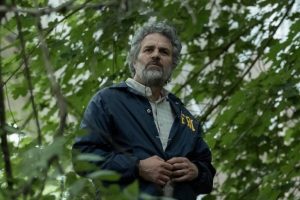Recently, my family and closest friends gathered for my son’s baptism. We were joined by our larger church community, people we’re connected to in varying degrees, some of whom we embrace upon greeting, others whose hands we clasp briefly with a single word—peace—only once a week. Even my husband’s parents, unable to make the trip, were present. My son’s uncle, the baby’s godfather, set up a video call and tucked his phone in his pocket so they were able to witness the splashing of holy water and joyful singing even 1,700 miles away.
We laid hands on my son and prayed. We passed him around, parent to godparent to grandparent, and so on. One by one, the entire community traced the sign of the cross with their thumbs on his forehead and heart, welcoming him into the fold, naming him one of us.
It was more than I could have hoped for. And yet, it was everything I’ve imagined: a community for my son to grow up in, extended and close, near and far. After church-shopping for a decade, his birth made it more urgent than ever to just pick a place. Once we did, in order to strengthen our bonds with the parish, we set plans in motion for baptism. Children are a wonderful and rewarding way to hold yourself accountable to good intentions.
As we planned his baptism, I thought about how rare it is to see the experience of community reflected back at us in pop culture, at least in any meaningful way. More often than not, religion and communities of faith are misrepresented, or worse, caricatured, to be passed over as jokes or annoying obligations with which protagonists must contend. Religion is almost never shown for one of the most profound experiences it offers its adherents: community.
In one of my favorite shows, Gilmore Girls (WB/CW), which ran for seven seasons and is earning scores of new fans on Netflix, Rory Gilmore’s best friend, Lane Kim, is a Seventh Day Adventist with an ultra-strict mother who won’t allow her to listen to rock music or eat junk food. Lane, of course, loves both. The friends spend much of their time plotting how to get around Mrs. Kim’s rules. While Mrs. Kim’s faith demands might seem arcane and even laughable, it’s not hard to imagine that for her, a single parent and immigrant, her faith community provides a support system.
In Netflix drama Orange Is the New Black, Tiffany Doggett, aka “Pennsatucky,” is a character whose faith is portrayed negatively. As Religion & Politics writer Xarissa Holdaway says, “Incarcerated Pennsatucky spouts scripture, tries faith-healing on her fellow inmates, and collapses the chapel ceiling by hanging an enormous, against-the-rules handmade cross from a flimsy beam. She’s emotionally unstable, she threatens and punishes other inmates, and she’s ignorant, racist, and homophobic.”
Christianity is the punchline; Pennsatucky, a stereotype. She’s in prison for murder, has had multiple abortions, and yet she preaches fire and brimstone. She has a small handful of equally ignorant followers, but the message here isn’t about community. Instead, it’s that Christians are hypocrites or simply duped. In other words, stay away.
Meanwhile, studies show that having faith can lead to a longer, happier life. Dan Buettner studied communities across the globe where it’s not uncommon for people to live to age 100 and, more important, age gracefully. Rates of depression, dementia, and disease in places like Okinawa, Japan; Sardinia, Italy; and Loma Linda, California—aka the Blue Zones—are decidedly low compared to the United States and Europe as a whole. One of nine things people in these places have in common is faith.
Naturally, much of the coverage of Buettner’s work focuses on how people eat (less meat, more beans), exercise (move more), and relax (take naps) in the Blue Zones. But four of those nine commonalities have little to do with food and a lot to do with what church can provide: having a purpose to wake up to every day, recognizing the power of love and family, staying social, and having faith. These seem to play a large role in increasing quality of life and life expectancy. Perhaps it’s easier to change eating habits than it is to join a community or find a purpose for getting up in the morning.
My husband and I recognize that we can’t raise our son alone. Without help from our larger community we cannot help him to have a flourishing spiritual life, to recognize God in himself and in others, or to discover his own purpose for waking up every morning. So by baptizing him, we’ve decided to trust in the power of love and family, to stay socially connected, to have a little faith.
Our priest told us this decision was brave, because as Americans we have a thread of individualism woven tightly into our stories. And the rewards of having and practicing faith within a community don’t have a prominent place in our cultural consciousness because they simply aren’t present in pop culture. We speak more about bootstraps and self-made individuals than we do about reliance on others. We celebrate can-do attitudes over admitting need.
This is deeply problematic for our culture, and it runs counter to Christianity. It breeds loneliness and fear. And without the regular day-to-day practice of being a community, of trusting in and caring for each other, how can we expect each other to stand side by side, to make sacrifices, to help when the going gets really rough?
Eating plenty of beans and taking walks and naps for a long and happy life sounds wonderful. But Christ promises everlasting life, a promise I believe is best experienced in community, in service of one another, and practiced daily.
This article appeared in the September 2015 issue of U.S. Catholic (Vol. 80, No. 9, pages 40–41).
Image: © The Claretians













Add comment